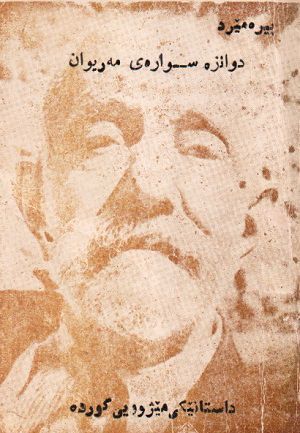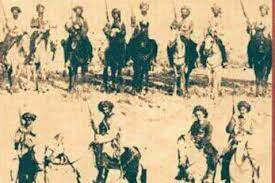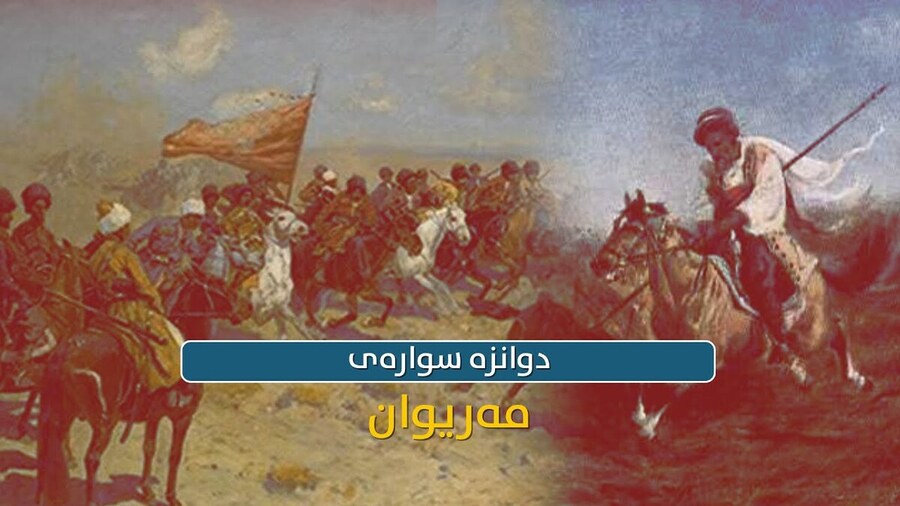The Beyt (a kind of Kurdish song) of the twelve chevaliers of Marivan has been narrated orally from one generation to another, it is about an unfair battle between twelve warriors of Marivan who fought with a 12 thousand-men army of the enemy near Zrebar Lake in Marivan's plain and they had defeated that army. This story, like all the other Kurdish stories and tales and Beyts, in addition to its literary and aesthetic characteristics and its storytelling techniques is a part of the unfulfilled secret wishes and the bitter truths about Kurdish fate and their history. if we look at the Battle of the Twelve Chevaliers as a historical event, the historians do not agree on the true happening of this event and they have determined three theories about it:
The first theory which is represented by "Rich" and "Longrigg" says that this battle happened during the rule of Suleiman Pasha I who was in fact "Suleiman Baba son of Faqe Ahmad" in 1110 Hijri or 1698 AD.
The second group believes that the battle happened in 1164 Hijri that is 1750 AD, during the reign of the deceased "Suleiman Pasha son of Khalid Pasha".
The third theory says that this battle happened during the reign of "Abdul Rahman Pasha Baban" in 1221 Hijri/1807 AD.

However, the researchers from Marivan have a totally different view about this incident and they identify the twelve chevaliers of Marivan to be from this area, they accused "Piramerd", and other historians from the northern part of Kurdistan of identifying these chevaliers as Baban warriors unfairly. They believe that those who say these warriors were not from Marivan have betrayed the Marivan people and have recorded the heritage of the twelve chevaliers as their own (Husseini, 2009: 9).
They believe that these twelve chevaliers were all from Marivan and from a tribe that lived in the Baban emirate; they also believe that the twelve chevaliers were not those whom "Piramerd" or "Hussein Nazm Bag" have mentioned in their books and the battle happened during the reign of "Khasraw Khan Ardalan" in the "Galga" plain in Penjwen region. In Penjwen Plain an army had attacked the Baban army, but not in Marivan Plain near Zrebar Lake (Heidari Kani Sanani, 2010).
Although we cannot talk about this subject here elaborately, however, briefly we can say that according to "Rich" and "Longrigg", it appears that the Twelve Chevaliers Beyt that Piramerd has recorded might have become popular during "Suleiman Baba son of Faqe Ahmad". After the battle of the great warriors of "Suleiman Pasha son of Khalid Pasha" and after defeating "Salim Bag" and "Karim Khan Zand" army who was Kurdish man, this story must have been retailed again. After "Shah Ghazi Ahmad", the combatant, defeated a large army of thousands of soldiers near Zrebar Lake more songs were sung and after the murder of "Salim Setanga" brother of "Abdul Rahman Pasha of Baban" and the defeat of the Baghdad army and the Ottomans in another battle in Marivan plain, the Beyt singers have narrated these wars in their songs mentioning "Salim Bag's" name in their Beyts which has been recorded by "Piramerd" as the twelve chevaliers Beyt.
It is necessary to mention that in "Piramerd's" story the names of several villages and places of Marivan have been mentioned from where the twelve chevaliers of Marivan have attacked the large army of the enemy; these places are: Kolan, Sef, Daseran, Mousk, Payala, Ne and Yangija. All of these villages are still a part of Marivan. However, "Claudius James Rich" who was a British tourist and a commander of the East Indies company and came to Kurdistan from Baghdad, visited Marivan during his travels in 1820 and he described Marivan plain and Zrebar Lake and the surrounding mountains in detail. "Rich" was the guest of a Jaff tribe leader in a place where it is called "Bari Bagzadeh" nowadays near Zrebar Lake describing the nature, mountains and plain of that region as well as the traditions of the Jaff clan for hosting and welcoming a guest, their clothes, their tents and their way of life as nomads however, he does not mention the name of any of those villages mentioned above where Piramerd claims the twelve chevaliers had fought the enemy from those places (Rich, 1980: 198). Rich used to mention the names of all those places he had visited in detail. Now, a question will be asked in 1820 that is 201 years ago, all those villages that are now a part of Marivan Plain and the surrounding areas of Zrebar Lake did not exist. If those villages did not exist at that time, so we can say that the twelve chevaliers' Beyt by Piramerd must have been retailed later in a more recent time and the names of those villages might have been added to it.

The story of the twelve chevaliers of Marivan and the other Beyts, tales, and myths of this land not only talk about the difficulties and sufferings and the bravery of the Kurdish warriors but also narrate a part of the Kurdish people's wishes and dreams against their occupiers and enemies. However, when we sum up all these historical events, we can claim that twelve brave Kurdish heroes must have existed who fought against a large army and must have defeated them although there is a bitter truth in this event and that is the battle between two Kurdish emirates who fought one another because two superpowers of the region had provoked them against each other. Although the story of the twelve Chevaliers is about the Kurds' bravery and heroism in battle, after reading historical books and clearing up the historical traits of this battle, the struggles of the Baban emirate among themselves will be highlighted and the enmity of this emirate with the Ardalan emirate can also be seen which ends in a battle and the defeat of Karim Khan Zand's army who was also Kurd.
Now the question is this, if the battle of the twelve chevaliers of Marivan had truly happened as history tells us, is it still wise to be proud of it? This event is the battle of Kurds against Kurds, can we feel happy about the defeat of the Kurds? Do Kurds' battle skills and heroism back then and even now should only serve the world's superpowers' interests? Is it fair that Kurds' blood should be spilled to protect the borders and interests of everyone but the Kurds themselves? The experts, supporters, and politicians of Kurdistan must analyze the Kurdish society's psychology in a scientific and modern way and design long-term plans to reestablish their nation's interests and benefits and their taboos and sacred myths so that the new generations could identify themselves with it.
Source:
-Nawshirwan Mustafa Amin (June 1998), Baban Heritage between the Roman and Ajam's superpowers, Suleimani, Khak Publications.
-Husseini, Ismaeil (2009), Marivan's Twelve Chevaliers, Sanandaj, Tavga.
-Rich Claudius James (1991), from Arabic to Kurdish: Mohammad Hamabaqi, Tabriz, …
-Heidari Kani Sanani, Naser (2010), Marivan's Twelve Chevalier Epic, a forgotten story, Didgah periodical.








